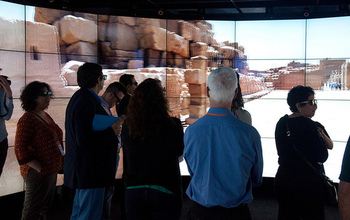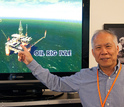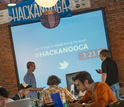News Release 14-021
Catalyzing gigabit apps for learning and workforce development
NSF and Mozilla launch Gigabit Community Fund to drive app development for next-generation networks

3-D images were streamed live at the 2013 US Ignite Application Summit using high-speed networks.
February 6, 2014
This material is available primarily for archival purposes. Telephone numbers or other contact information may be out of date; please see current contact information at media contacts.
Wonder how we'll be using the Internet in five to 10 years? Take a look at Kansas City and Chattanooga, where experiments in high-speed networking are taking shape.
Today's Internet networks typically move data at a few to a few hundred megabits per second. However, next-generation networks can carry traffic at greater than a gigabit per second--a speed-up of ten to a hundred times. These gigabit networks have incredible potential, but require applications (apps) that can take advantage of them to fully tap their benefits.
The City of Chattanooga, Tenn., is hosting a kickoff and community summit today for the Gigabit Community Fund, a new partnership between the National Science Foundation (NSF), Mozilla, and local communities that uses a collaborative approach to create apps that will facilitate novel uses for gigabit networks. The open source software developed under this program will take advantage of the advanced networks that are already available in Kansas City and Chattanooga and that will be emerging nationwide in the coming years. Kansas City will host its kickoff on Feb. 13.
"We are thrilled that the Gigabit Community Fund is bringing together practitioners and innovators from public and private sectors to enable novel gigabit applications for learning and workforce development," said Farnam Jahanian, NSF's head of Computer and Information Science and Engineering. "These new apps will have the potential to boost productivity and safety--starting as an experiment in these two communities and growing across the U.S."
At today's event, Chattanooga Mayor Andy Berke and representatives from Mozilla, NSF, the Department of Education and local organizations describe how the Gigabit Community Fund will provide $300,000, split evenly between Chattanooga and Kansas City, to catalyze the development of apps that leverage ultra-high speed broadband networks in service to learning and workforce development needs.
"Between Code for America, Mozilla's Gigabit Community program, our city's strong sense of collaboration, and the incredible connectivity we have with the gigabit infrastructure, we're strategically situated to provide solutions for government, education, workforce development and beyond," said Berke.
"I'm proud that NSF and Mozilla have chosen to work with Kansas City as part of the Gigabit Community Fund," Kansas City, Mo., Mayor Sly James said.
The fund continues to advance US Ignite, an initiative announced by the administration in 2011 with the goal of cultivating public and private partnerships to jumpstart the development of gigabit applications. As the lead Federal agency for US Ignite, NSF first partnered with Mozilla in fall 2011 to implement a creative, contest-driven model of community-based app development. In the last two years, 300 ideas for gigabit applications have surfaced and 22 teams received support to develop their ideas into gigabit app prototypes.
By combining institutional partnerships, a new fund to support app development and a repository of open source tools, code and documentation, the Gigabit Community Fund aims to further demonstrate the potential for ultra-high-speed broadband networks, with a particular emphasis on significant contributions to education, learning and workforce development. The Gigabit Community Fund will provide awards ranging between $5,000 and $30,000, based on the needs and opportunities demonstrated in the proposal. Funded work must deliver real value to end-users and must be proposed in collaboration with local organizations.
"Mozilla is building a web where people know more, do more and do better," said Mark Surman, Executive Director of Mozilla. "The Gigabit Community Fund will do that by demonstrating the potential public benefit that gigabit networks have. With support from NSF and a community-based approach towards collaboration and experimentation, we're confident that local innovators will make real progress towards transforming education and workforce development opportunities in Chattanooga and Kansas City."
Mozilla will establish Hive Learning Communities in Chattanooga and Kansas City, similar to its Hive Learning Networks in New York City, Chicago, Toronto and Pittsburgh, where organizations collaborate around shared goals in digital learning and making, and economic opportunities. "Community catalysts" in each city will help bring members of the different communities together.
"I look forward to working with the National Science Foundation and US Department of Education, whose investment in this initiative will help keep Chattanooga positioned as a leader in technology and innovation," said Berke.
Added Mayor Mark R. Holland of Kansas City, Kan.,: "Since the inception of our city's fiber infrastructure we have seen amazing development. We are very excited that the partnership with Mozilla and NSF will yield new programs to fuel future success in education and workforce development using our gigabit connectivity."
-NSF-
-
Gigabit networks enabled modeling by Louisiana Immersive Technologies Enterprise (LITE).
Credit and Larger Version -
Mozilla and NSF previously partnered to host Hackathons to spur innovative app development.
Credit and Larger Version
Media Contacts
Aaron Dubrow, NSF, (703) 292-4489, email: adubrow@nsf.gov
Lainie DeCoursy, Mozilla, (917) 607-2525, email: lainie@mozillafoundation.org
Program Contacts
C. Suzanne Iacono, NSF, (703) 292-890, email: siacono@nsf.gov
Ben Moskowitz, Mozilla, (714) 420-6471, email: ben@mozillafoundation.org
Kari Keefe, KC Mozilla Gigabit Community Fund, (816) 588-3531, email: kari@mozillafoundation.org
Lindsey Frost Cleary, Chattanooga Mozilla Gigabit Community Fund, (347) 510-7534, email: lindsey@mozillafoundation.org
Related Websites
Gigabit Community Fund award abstract: http://www.nsf.gov/awardsearch/showAward?AWD_ID=1344309
US Ignite at NSF: http://www.nsf.gov/news/special_reports/usignite/index.jsp
NSF and Mozilla Announce Breakthrough Applications on a Faster, Smarter Internet of the Future: http://www.nsf.gov/news/news_summ.jsp?cntn_id=128315
NSF and Mozilla Announce Winning Big Ideas for New Applications on a Faster, Smarter Internet of the Future: http://www.nsf.gov/news/news_summ.jsp?cntn_id=125515
The U.S. National Science Foundation propels the nation forward by advancing fundamental research in all fields of science and engineering. NSF supports research and people by providing facilities, instruments and funding to support their ingenuity and sustain the U.S. as a global leader in research and innovation. With a fiscal year 2023 budget of $9.5 billion, NSF funds reach all 50 states through grants to nearly 2,000 colleges, universities and institutions. Each year, NSF receives more than 40,000 competitive proposals and makes about 11,000 new awards. Those awards include support for cooperative research with industry, Arctic and Antarctic research and operations, and U.S. participation in international scientific efforts.
Connect with us online
NSF website: nsf.gov
NSF News: nsf.gov/news
For News Media: nsf.gov/news/newsroom
Statistics: nsf.gov/statistics/
Awards database: nsf.gov/awardsearch/
Follow us on social
Twitter: twitter.com/NSF
Facebook: facebook.com/US.NSF
Instagram: instagram.com/nsfgov


